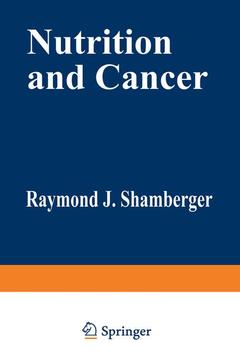Nutrition and Cancer, Softcover reprint of the original 1st ed. 1984
Langue : Anglais
Auteur : Shamberger Raymond

The importance of environmental factors in the etiology of the major degener ative diseases, including cancers, is now generaIly accepted. Evidence obtained from studies with experimental animals and from human populations associates nutritional factors and dietary constituents with the causation of cancers at differ ent sites in the body. Estimates by epidemiologists based on comparisons of various population groups have indicated that as much as 50% of the cancer mortality may be influenced by diet. An important indicator is found in migrants to the United States or to other countries who develop the spectrum of cancers typical for the United States (or other countries) but different from that reported for their native country. About 20% of aIl deaths (450,000 per year) in the United States are caused by cancer. In addition, as the population grows the number of cancer cases steadily increases, but the age-adjusted total cancer incidence and mortality rates for sites other than the respiratory tract (cancers primarily attributable to cigarette smoking) have remained stable during the last 30 to 40 years. If one-half of these cancers are associated with dietary practices, an understanding of the process could save about 225,000 lives each year. The causes of cancer have been an important area of cancer research for many years. Certainly if one understands how the diet or the environment affects cancer, great insights might be gained into the mechanisms of cancer as weIl.
1 Scope of the Problem of Nutrition and Cancer.- Environmental Carcinogenesis.- Ways in Which Diet Might Affect Cancer.- Mechanisms of Cancer Formation.- Cancer Trends.- References.- 2 Macronutrients and Cancer.- Lipids.- Protein.- Amino Acids.- Carbohydrate.- References.- 3 Dietary Fiber and Cancer.- Epidemiological Evidence.- Experimental Evidence.- References.- 4 Vitamins and Cancer.- Vitamin A.- Effects of Vitamin A on Metaplasia and Carcinogenesis in Animals.- Vitamin B.- Vitamin C.- Vitamin D.- Vitamin E.- Vitamin K.- References.- 5 Minerals and Cancer.- Selenium and Cancer.- Selenium and Mutagenesis.- Selenium and Immunity.- Zinc.- Copper.- Iron.- Molybdenum.- Iodine.- Manganese.- Fluoride.- Magnesium.- Potassium.- Arsenic, Cadmium, and Lead.- Mixtures of Metals.- References.- 6 Mutagens in Food.- Mutagens Resulting from Cooking of Foods.- Mutagens from Pyrolyzed Proteins and Amino Acids.- References.- 7 Naturally Occurring Carcinogens.- Mycotoxins.- Other Mycotoxins.- Hydrazines.- Plant Constituents and Metabolites.- Metabolites of Animal Origin.- References.- 8 Additives and Contaminants.- Additives.- Food Colorings.- Contaminants.- References.- 9 Unproven Cancer Diet Claims.- Laetril.- Pangamic Acid.- Unproven Therapies.- Analyses of Specific Unorthodox Programs.- References.- 10 Cancer Cachexia.- What Is Cancer Cachexia?.- Patient Assessment.- Pathogenesis of Cachexia.- Management.- References.
Date de parution : 04-2012
Ouvrage de 372 p.
15.5x23.5 cm
Thème de Nutrition and Cancer :
Mots-clés :
breast cancer; cancer; cancer research; cancer treatment; carcinogenesis; clinical trial; etiology; hormones; liver; mortality; mutagen; pancreatic cancer; pathogenesis; skin cancer; tumor
© 2024 LAVOISIER S.A.S.



